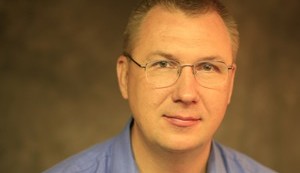Eugene Passes the Turin Test
on

At the Royal Society in central London this weekend a computer program named Eugene Goostman succeeded in convincing 33 % of a panel of judges that they were indeed communicating with a real 13-year old person. The test was devised in 1950 by computer science pioneer Alan Turing, who said that if a machine was indistinguishable from a human, then it was "thinking".
On the 60th anniversary of Turin’s death it is the first time the test has been passed, which requires 30% of human interrogators to be tricked during a series of five-minute keyboard conversations. Professor Kevin Warwick, from the University of Reading, said: "In the field of artificial intelligence, there is no more iconic and controversial milestone than the Turing test. The result represents a milestone that will go down in history."
The successful machine was created by Russian-born Vladimir Veselov (shown) who lives in the United States, and Ukrainian Eugene Demchenko, who lives in Russia. Veselov said: "It's a remarkable achievement for us and we hope it boosts interest in artificial intelligence and chatbots."
Prof. Warwick said there had been previous claims that the test was passed in similar competitions around the world. "A true Turing test does not set the questions or topics prior to the conversations," he said. "We are therefore proud to declare that Alan Turing's test was passed for the first time." He went on to say that this had "implications for society" and would serve as a "wake-up call to cybercrime".


Discussion (0 comments)